Cartoons: Happy New Year!
Want even more laughs? Subscribe to the magazine for cartoons, art, inspiring stories, fiction, humor, and features from our archives.
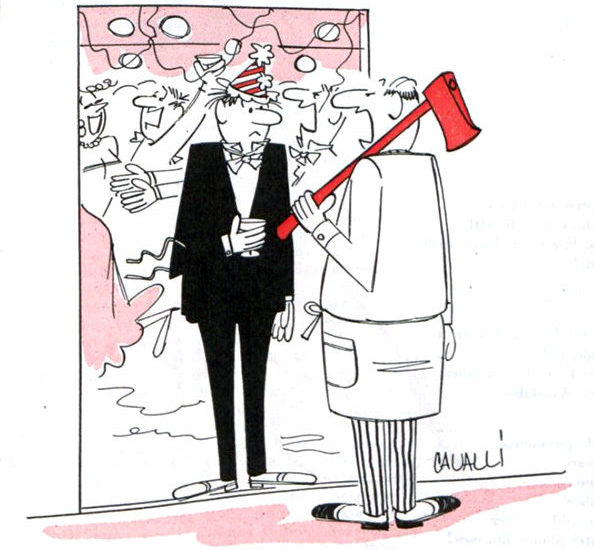
Cavalli
March 21, 1953
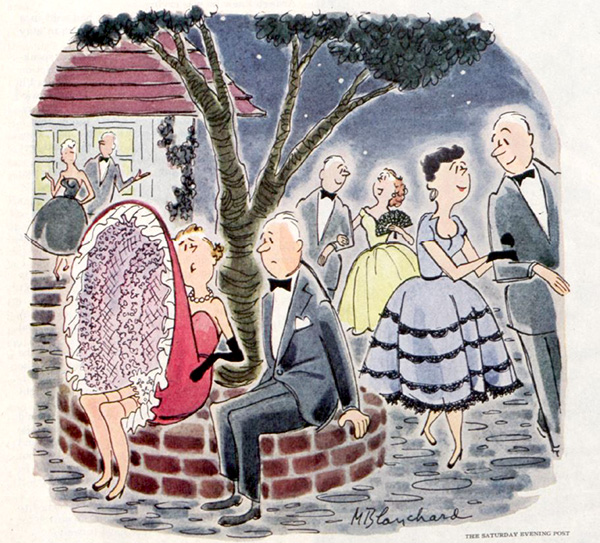
M. Blanchard
January 5, 1952
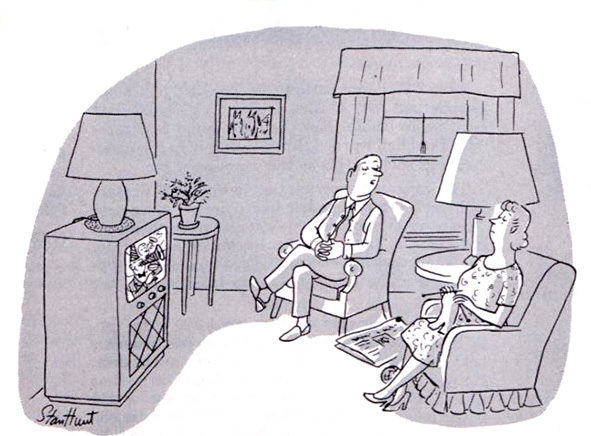
Stan Hunt
January 3, 1953
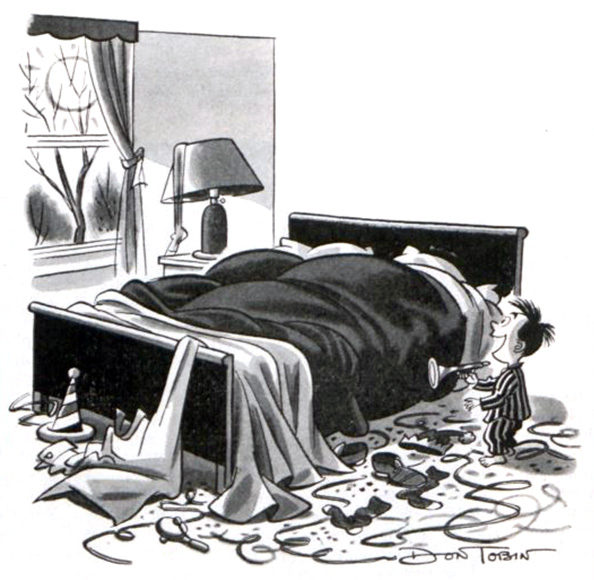
Don Tobin
January 3, 1953
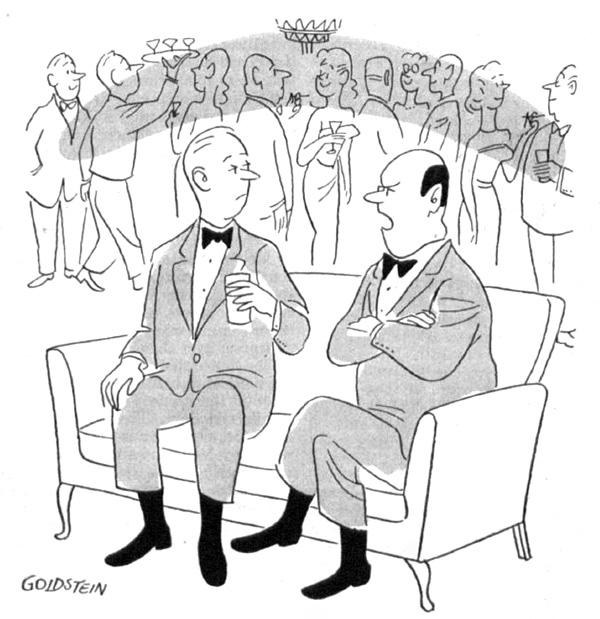
Goldstein
May 24, 1952
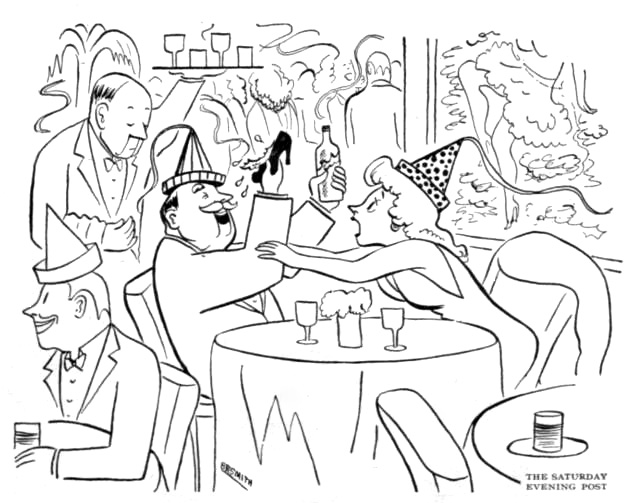
B.R. Smith
December 2, 1944
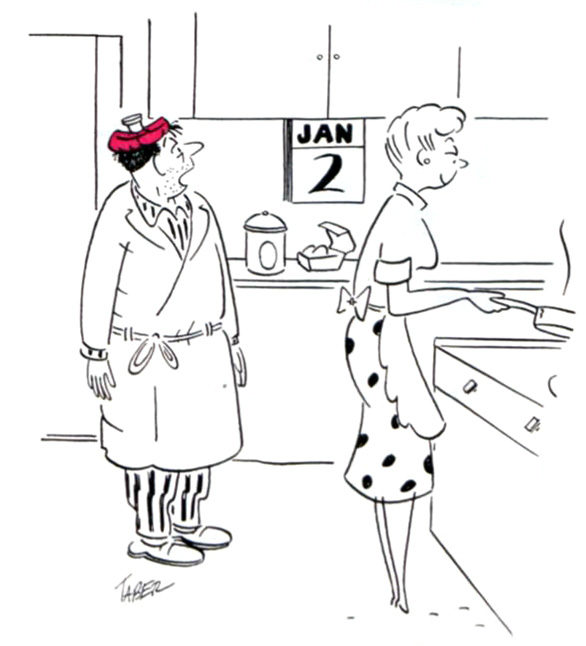
Taber
January 2, 1954
Want even more laughs? Subscribe to the magazine for cartoons, art, inspiring stories, fiction, humor, and features from our archives.
“Bwah-Wahdi-Dough” by Henry Anton Steig
Bronx-born Henry Anton Steig was a textbook Renaissance man. As a saxophonist, painter, cartoonist, writer, astronomer, and jeweler, the man of many talents was sewn into much of 20th-Century iconography without ever becoming a household name. His fiction appeared in The New Yorker, Esquire, and Collier’s, he worked with songwriter Johnny Mercer in Hollywood, and his Manhattan jewelry shop even played the background of Marilyn Monroe’s iconic subway grate scene in The Seven Year Itch. His story “Bwah-Wahdi-Dough” is a swinging New Year’s Eve affair with a complicated love triangle bursting with colorful city dialect.
Published on January 9, 1937
In the hallway of the apartment house, Harry Tack looked himself over carefully, brushed a bit of lint off the velvet collar of his form-fitting topcoat, and then rang the bell marked “Smith.” The door was opened by one who, he had decided, was a very cute number; not much over five feet tall — just about right for his own five-six — slimly and gracefully curved in a very special way, and with large dark eyes and amber-colored hair.
“Hello, Harry,” she said.
“Hi, Sue.” Harry followed her into the apartment.
Susan introduced him to her parents. They were in the kitchen, Mr. Smith reading, and Mrs. Smith knitting, and Harry was thankful that they remained there when Susan took him into the living room. He sat down in an easy chair, carefully putting some slack in his trousers first, and Susan sat opposite him on a couch.
“Must be nice having a night off from the trumpet,” she said.
“Oh, I never get tired of the piston,” Harry said. “I wouldn’t mind playin’ it every night ’na week, except when I got sumpm extra out of the ordinary on, like tanight.”
“Do you like clubbing better than steady work?” Susan asked, having acknowledged the compliment with a smile.
“Yeah, fra while, anyhow. Bill Devoe’s band’s got a pretty big rep, and Miller’s a good agent, so we’re kept on the go. It’s nice woik and we get it; fun playin’ to a different crowd every time. And with the Honeybunny hour twice a week and groovin’ plates for the Phonodisk Company, everybody’s happy far as dough’s concerned. How about you? Hodda you like clubbin’?”
“I’ve given up the idea of becoming an opera star,” Susan said regretfully, “so I have to like it. Trouble is, clubbing’s not very dependable.”
“I wouldn’t worry if I was you. Miller likes your woik, and you got a good contact with our band. It was just last week he started bookin’ you, wasn’t it? And you played two dates with us awready. That ain’t bad. ‘Fcourse, not everybody wantsa pay for extra entertainment outside of the band, but I wouldn’ be surprised if you knock off three dates a week on the average. And after a while maybe you’ll catch a wire too.”
“Radio would help a lot. Do you really think there’s a chance?”
“Well, there’s lotsa woiss singers than you on the air.”
That didn’t sound at all complimentary, and it made Susan involuntarily lift her eyebrows. Being informed, after some years of study, that her voice wasn’t big enough for opera or for the concert stage had made her somewhat unsure of herself. Looks, she knew, counted in this new work she was doing; she was not unaware of her attractiveness and of the obvious possibility that it colored people’s opinion of her as an artist. She wanted to be rated solely on ability. She had met Harry only twice, when she had worked with the band, and had talked to him for but a few minutes each time. When he had asked, simply, if he might come to see her, she had acquiesced, because she had immediately been attracted by his earnest manner and his frank, boyish smile, and because it was refreshing not to be subjected to the overture of wisecracks which she had come to believe to be a fixed Broadway custom. Harry seemed to be the sort who would be honest with her. She was a bit apprehensive of what his opinion might be, but, nevertheless, she took the plunge.
“Harry,” she said, “you’re an experienced dance musician, you’ve heard lots of singers of popular songs and you ought to know a lot about it. Tell me, do you like the way I put my songs over?”
“Well, look, kid,” Harry began, deliberatingly. “Do you want the oil or the real lowdown?”
“I want you to say what you really think, of course!”
Harry lit a cigarette, realizing that he had already committed himself to some sort of criticism. Well, Susan seemed really to want to know the truth, and he decided that it would be kinder to give her a good steer rather than the meaningless raves to which she was probably accustomed.
“Awright,” he said, “the lowdown. Here it is: You got a nice sweet paira pipes. And the voice does sumpm to the customers; otherwise, even though you are a cute package, Miller wouldn’ keep on bookin’ you. But there’s a million dames with good looks and nice straight voices. Some of ‘em even get inta the big dough. So what?”
“I’m listening.”
“Well, the point is you’re woikin’ with a swing outfit. Whyncha try to loin sumpm about swing?”
“But I’m not a trumpeter or a saxophonist. I’m a singer.”
“Whatsa difference?”
“Why, there’s lots of difference.”
“But there shouldn’ oughta be! A singer oughta think of ’erself like one of the instruments, specially when she’s woikin’ with a band. Why do singers hafta be corny? Odduv every thousand there’s maybe one — like Connie Boswell — who’s got the real mmph — you know what I mean — the real bounce, the real shake. The rest of ’m, well, insteada puttin’ a riff in where it belongs, they shake their elbows or their hips, or they say ‘hi-dee-hi,’ as if it was the woids insteada the notes that counts. ’Fcourse, the old poissonality hasta be there, and it’s much more important with a dame who’s singin’ than with a musician. But it gets me sore the way they fool the customers. Spose, when I had a solo, I jumped up and began wigglin’ around and playin’ icky — would that make me a ride man? Not by a long shot. Then why do they call a singer hot when all she’s got is a figger and maybe a cute way of flashin’ ’er lamps?”
“What would you want me to do — imitate Connie Boswell?”
“You could do woiss. Butcha don’t hafta imitate ’er. Study ’er stuff and get the feelin’ for it. And then you can start puttin’ your own stuff in. You don’t hear me imitatin’ anybody, do you? Inna beginning, I got all my stuff from Red Nichols and Louie Armstrong and a coupla others, and then, when I got kinda soaked in it — it got all mixed up, sorta, inside of me — it began comin’ out more and more different and original alla time.” Harry was getting excited. He looked hopefully at Susan, but sensed that there wasn’t much rapport between them on the subject. “I don’t know if I’m puttin’ myself across, kid. It’s hard to say what I mean, except on the horn.”
“I think I understand,” Susan said doubtfully.
“You hafta wanna give,” Harry said. “You hafta wanna get off on it, like Cab Calloway or the Mills Brothers.”
Susan stared at him perplexedly. The swing temperament, to her, was unfathomable. Swing musicians, as a group, were all very queer. They laughed at the strangest things; always seemed to be enjoying among themselves a joke the point of which outsiders couldn’t get at all. They belonged to a distinctive sect and appeared to be aware of it. Perhaps their attitude of lightheartedness was due, in. part, to the fact that they didn’t know what work — in the sense that her father, for example, pushing a plane and a saw all day, understood it — really meant. Their work was the happiest kind of play. No wonder they couldn’t be serious about anything. Perhaps Harry was different from the others in that respect. But she doubted that any subject — no matter how important — but swing music could inspire in him the intense enthusiasm, the almost religious fervor with which he had been talking.
“Look, Sue,” Harry said in desperation. “I can see I didn’t make it click yet. Forget about everything I told you and come over here to the piano.” He sat down at the baby grand. Susan stood at the upper end of the keyboard, facing him. “Now, I ain’t got much of a voice,” he said, “but I know how it oughta be done and I got enough control to give you some samples. Foist we’ll take one of the fundamental get-offs. In the old days it was ‘doo-wackadoo.’ Now it’s ‘bwah-wandi-dough,’ with a hotter swing. Get me?” Harry struck some simple chords. “Now sing. Bwah-wahdi-dough.”
Susan felt very silly. She blushed, swallowed a few times, and then sang the syllables.
“Again,” Harry said.
She sang them again and several more times.
“You don’t get the accent right,” said Harry. “Step on the ‘di,’ but cut it short.”
He demonstrated once more. Susan repeated it, but it still lacked fire.
“Well, I can see that don’t click either,” Harry said. “But maybe it will if I give you a longer phrase to hang on to. Here: Bwah-wahdi-dough. Mbee-mbah-mboodi … No, no. When you get to the sounds beginning with b, make your lips spring open — blow ’em open — it should be like a series of liddle explosions, and the mm’s tie ’em together.”
Susan, though anxious to learn, still didn’t get it. She stood there, doing things with her lips like a silly goldfish — but a very beautiful goldfish — until Harry began to forget about the lesson. He was debating whether to do to those lips what seemed, at the moment, had to be done, but just as he leaned toward her, there was a “Grmph” from the doorway. Mr. Smith was standing there.
“Pardon me,” he said, “but is there something wrong? Mrs. Smith was worried. Asked me to find out what those strange noises were. And I must admit I was a bit alarmed too.”
Harry and Susan looked at each other and burst into laughter.
“We’re laughing at ourselves, dad,” Susan explained. “Harry is just trying to teach me something about shake music.”
“Oh, I see,” said Mr. Smith, as he withdrew. But it was quite plain that he didn’t “see” at all.
“Try those b sounds again,” Harry said, standing up and facing Susan. This time he didn’t care in the least whether she did it right or not. As soon as she had pursed up her round, ripe, cherry-red lips, he pounced at them with his own. She drew back, but not quickly enough to make the frown which followed appear consistent.
“Gee, Sue, I hope you don’t think the whole thing was just a gag,” Harry said. “That wasn’t part of the lesson. I just couldn’t help it. Honest, I couldn’t. Are you angry?”
He was so palpably contrite, Sue’s frown vanished.
“Of course, I’m angry,” she said. And then she smiled, because she had to admit to herself that it wasn’t true.
Harry went home with two previously formed opinions strongly confirmed. First, that Susan was a knockout. But second, that, as far as swing was concerned, she just didn’t have what it takes. It was difficult to explain that to her. Everybody was talking about swing, but very few knew what it meant. There had been a time when it annoyed him that people insisted on thinking they did know. But not now anymore. He had learned that the most one could hope for was a few sincere appreciators. There were always the members of the band, of course, and once in a long, long while, an outsider. You could easily tell, looking over a crowd of dancers, which ones you were really reaching. The rhythm got all of them — that was fundamental — but it was just one or two couples who usually kept near the bandstand while they danced, straining their ears for the pretty little subtleties of swing music, who really “felt” it. You could see them respond — with a grin, a jerk of the head, a sudden quick step — to that funny scream on the clarinet, the bubbly gliss on the trombone, the metallic hiss of muted cymbals in a cleverly inserted beat between embellishments of the solo instruments. And when the dance was over and the dancers stood, panting and applauding, on the floor, you caught the eye of one of them, perhaps, and it was like a precious secret between you. The others would never know, and there was nothing anyone could do about it. One either had the gift for appreciation — it seemed as rare, almost, as the gift for creating hot music — or one had not. Susan happened to be one of those who had not. Perhaps it would have been better not to have started it at all — this business of singing hot. She had been getting along nicely without it. Why get her all upset and dissatisfied with herself about it? And who was he to try to meddle with the intangibles of personality and temperament? Better to leave things as they had been. She was a wonderful kid and he was in love with her. When that and the promise in her smile after the stolen kiss were considered, swing seemed of very little importance.
But Harry’s decision not to meddle further with Susan’s singing technique had been reached without consulting Susan. Her interest aroused, she begged for further coaching. Harry would have liked to take her places, but she wanted to stay at home and practice singing, and he had to consent. So the coaching went on, without any sign of improvement in Susan’s style. Until one night, Harry, made irritable by her insistence on singing when he wanted to hold her in his arms and talk about the future, lost patience.
“Oh, what’s the use, Sue?” he said, after a half hour’s repetition of some simple hot phrases which Susan made sound very chilly. “You ain’t got it and you never will get it. Sorry I ever brought it up.”
“But I thought I was doing pretty well,” Susan said, very disappointed.
“That’s the hell of it,” Harry tried to explain. “It’s like a trumpet I once knew. He was a good paper man — went as far as anyone could, just readin’ the spots — but there wasn’t a real hot note in his whole getup. He should’a’ known it, but, like you, he didn’t. All of a sudden he got the notion that he was a sender, and he began tryin’ to play gut-bucket. Bought ’imself all kindsa tricky mutes, wasted a lot of rough tone, and it didn’t mean a thing. He thought he was a second Bix Beiderbecke and nobody could tell ’im anything different. It was awright when he played straight — there’s a place for straight men in this racket — but his sposed-to-be hot stuff was so sad that it took the bounce out of every band he woiked with. He got to be such a pain that none of the leaders would give ’im a job. And still he wasn’ convinced — thought the whole world had it in for ’im. Well, now he’s with a long-underwear gang, all cornfeds, like him; sorta hypnotized theirselves inta thinkin’ they know the way to town. He gets along somehow, but would you wanna be like that? Havin’ people who really know what’s what laughin’ at you? Take my advice and forget what I tried to teach you and go back to the straight stuff.”
Susan had tried so hard! She recalled the last time she had sung with the band. After one of her numbers, she had looked to Harry for encouragement, but all she got was a sad smile, sympathetic, but one which told her plainly that she was as far as ever from attaining what he had tried to teach her. Now she felt hurt, humiliated, and angry.
“Maybe you’re right,” she said. “I always thought it was vulgar, anyway. All that noise and blah — cheap!”
Harry didn’t like having the art form to which he was devoting himself spoken of in that way.
“If that’s the way you feel about it — noise and blah, cheap and vulgar — why dincha stick to grand opera in the foist place?” he said. “You should be at the Metropolitan at least.”
Susan was very touchy about her former aspirations. “Cheap and vulgar,” she spitefully repeated. “That’s what it is — and lowbrow!”
“Galli-Curci speaking!” Harry scoffed.
That was too much for Susan.
“Good night, Mr. Tack!” Susan said stiffly.
Harry stood up, straightening out all of his sixty-six inches. “Foist, sour grapes, and now a crack at my name. That ain’t cheap, I spose! Well, lemme tell you, there’s been some tremendous shots in the Tack family. That name’s got class. It ain’t corny — like ‘Smith,’ f’rinstance!”
Susan began to splutter, but that didn’t stop Harry from grabbing up his hat and coat and stamping out of the house.
The next time Susan sang with the band, she completely ignored him, and at the end of the evening she went home with Bill Devoe, the leader. Harry told himself that she was only trying to make him jealous, punish him. They’d make up, somehow. They had to — why, he had been on the point of proposing to her! Surely she knew how much he cared for her, in spite of the stupid quarrel they’d had. But Susan continued to let Bill take her home, night after night, and Harry began to upbraid himself for having lost his temper. He should have remained cool and polite, and then she would have had no justification for her coldness toward him. He wanted to talk to her, to apologize — if only she would meet him part way, so that he wouldn’t have to feel that he was forcing himself upon her — but she continued, stubbornly, to ignore him. Well, he wouldn’t try anymore, he decided. She’d have to be the first to talk now. He could be just as stubborn as she.
One night after a job, while the boys were packing their instruments, he caught Archie Wallenhoffer, the pianist, staring at Susan as she went out of the hall, arm in arm, as usual, with Bill Devoe. Archie was a big pudgy mopy fellow whom, it seemed, nothing could stir up except a hot tune. Harry somehow had never imagined Archie in love, but he realized now that the state of his own heart had not increased his awareness of what was going on around him. How could any man help falling for Sue?
“You too?” he said to Archie.
Archie sadly nodded. “How about a good old bender?”
Harry thought that a good suggestion, so they went downtown to a certain little place they knew and got thoroughly cockeyed.
“What chance do we stand,” Archie asked, “when Bill’s nuts about ’er?”
Harry, in a more sober state, might have considered the “we” presumptuous. Even now it seemed a bit too familiar. But as one who had been rejected, he couldn’t protest, even though it did make the whole affair something less than exclusive.
“Bill’s got everything a dame wants,” Archie went on. “Looks, dough and fame. And we’re just a coupla musicians — a dime a dozen.”
“Guess there’s only one thing for us to do,” Harry said. “You keep slappin’ the keys and I’ll keep ridin’ the piston, and we’ll both try to forget about ’er.”
This newly adopted philosophy of resignation, however, helped neither of them. Because it would have been difficult to forget a girl like Susan without seeing her two or three times a week. The one way out seemed to be to quit the band and seek a berth elsewhere. It was a hard thing to do. Harry had known the boys for a long time and they were the best friends he had. But Archie liked the idea, and it seemed easier to carry out when there were two of them. They decided to wait until New Year’s Eve, which was only a few days off. The band had an important engagement that night. For Harry and Archie it would be a sort of farewell party.
Early in the clear cold evening of the thirty-first of December there stood on a midtown corner a small built-to-order bus which had lettered on its sleek shiny outside, “Bill Devoe and His Club Orchestra.” The boys frequently played at homes and clubs in the suburbs, and the agent had decided that, musicians generally not being the most reliable people in the world, a private conveyance would save him a lot of last-minute headaches. Of course, there was no assurance that none of them would never miss the bus, but it was much more certain than having them travel as they pleased. Besides, the bus was a good advertisement.
Inside it were all the members of the band but the leader.
“I hope Bill gets here pretty quick with that broad,” said Al, one of the saxophonists. “It’s cold sittin’ still like this.”
Archie gave Al a dirty look. “Someday,” the pianist slowly said, “you’ll gedda good paste on the puss and maybe you’ll loin that not all dames is ‘broads.’”
“Why, Archie boy, is she got you sunk too?” Al asked.
The others all laughed, and Archie thought it best not to carry the subject any further. Harry didn’t say a word. He understood Archie’s chivalrous gesture and sympathized with it, but he was also inwardly amused by it. Another bus carrying a load of entertainers pulled up at the curb behind them. Then Bill and Susan arrived, and both buses started off uptown.
“Never too soon,” Al said, taking a flask out of his pocket.
But Bill stopped him. “Put that away! We got a job to do, New Year’s Eve or no New Year’s Eve. There’ll be enough of that later on. I want you boys to be able to toe the mark — at least until the customers don’t know the difference anymore.”
“Kinda dumb, anyhow, bringin’ your own along,” one of the men pointed out to Al. “Don’tcha think the Burgess crowd’ll take care of that?”
The Burgess home, a million-dollar estate, was forty miles out of town, in the hills. Old Man Burgess, it was said, owned most of the hills too.
The bus rolled steadily along, its chained wheels, echoed by those of the bus following it, clicking against the cleared strip of concrete between endless snow banks. Harry and Archie were slumped down in a rear seat, their knees against the back of the seat in front of them, their hats pushed forward over their noses. They tried not to stare too much at Susan, who sat in the front part of the bus, talking with Bill and the others near her. Frequently her laughter tinkled through the car. She seemed to be enjoying herself.
Al unpacked his clarinet.
“How ’bout you, Harry?” he asked. “C’mon, take out the plumbing.”
Al and Harry, it was conceded, were the best swingsters in the band. But Harry wasn’t swinging now.
“Sorry,” he said. “But I ain’t in the mood. Don’t expect anything but corn outa me tanight.”
“Corn, on New Year’s Eve? Wanna break my heart? Say it ain’t so!” Al pleaded, and he blew a high run on his clarinet.
Harry saw Susan turn around and glance at him; it seemed, from her thoughtful expression, that she was going to say something to him, but she quickly turned away. It gave him hope, but only for a moment. “Probably accidental,” he thought. “She didn’t mean to look at me at all.”
The trombonist and the guitarist took out their instruments and joined Al. The three of them played and the others sang, laughed and joked. All but Harry and Archie.
“Don’tchoo guys realize it’s New Year’s Eve?” Al said. He got up and went to the back of the bus and blew his clarinet at them. “Smadda with you two boids, anyhow?”
“Lay off!” Archie angrily whispered. “‘Beat it!”
Taken aback by the fierce tone — it wasn’t like Archie to get sore at anybody — Al shrugged his shoulders and rejoined the merrymakers at the front of the car.
The evening was still young when the buses pulled into the driveway of the Burgess estate, but several young people, obviously intent on a good time and as much of it as possible, met them at the entrance to the huge house and gave them a wild loud welcome. They were ushered into a ballroom whose size and splendor made them think for a moment that they were in a swanky hotel. Soon they had unpacked, arranged themselves on the platform at one end of the room, and started a dance number.
By ten o’clock, the ballroom was pretty well filled. It was a gay crowd, the holiday spirit was contagious, and Harry gradually lost himself in the music and began doing justice to his trumpet. Archie, too, couldn’t help swinging in good style. At eleven, the entertainers took part in a previously rehearsed floor show, night-club fashion. There was a chorus of dancers, some comedians, a quartet, and some solo numbers. After that their work was done and the entertainers mixed with the crowd. It was as much their party as the guests’. Susan, though, continued working with the band, singing a chorus or two, now and then.
At midnight there was a tremendous din. The guests blew whistles and horns, rang bells, cheered, shouted, yelled and generally conducted themselves as was considered seemly for the first few minutes of the new year. The band played Auld Lang Syne, everybody got a bit maudlin, and then, with the help of servants who were constantly making the rounds with loaded trays for those who were too lazy to help themselves from the side tables, things began gradually to disintegrate.
At about 2:30, the additive effect of the many little sips between dances were beginning to tell on Harry. He sat in a corner near the bandstand with a glass in his hand, wondering whether he had had enough to drink. More, he decided, couldn’t make him any more miserable than he already was. He contemplated the color of the liquid in the glass, preparatory to tossing it off — just like Susan’s hair it was when the light caught it — and then Bill tapped him on the shoulder. Bill had been drinking too.
“Snap odduvit, Harry,” he said unsteadily. “We ain’t played a number in about a half hour. And we can’t find Archie. C’mon, help me find Archie.”
All the men in the band engaged in a search, and finally Archie was discovered where no one had thought to look for him — on the bandstand under the piano, asleep. Bill angrily reprimanded him.
“Whaddaya mean, bawlin’ me out?” Archie complained as they got him to his feet. “Wasn’ I here alla time, ready for woik? ’At’s me, Johnny onna spot!”
When the band was ready to begin, Harry suddenly got a bad chill and began to shiver.
“Hold it a minute, fellas,” he said, getting up and going into the anteroom. When he returned, he was dressed in overcoat, muffler, hat, spats and gloves.
“O.K. Now we can start,” he said, and flopped into his chair.
“Quit clownin’,” Bill said, angrily. “You’re spoilin’ the looks of the band. Whaddaya think we’re wearin’ monkey suits for?”
“But I got a chill, I tellya. Want me to catch cold and die?”
“We don’t start till you take those extra duds off!”
“Suits me!” Harry put his trumpet in his lap, folded his arms, leaned back and closed his eyes.
“You’re fired!” Bill said in a rage.
Harry opened his eyes, looked at Bill and began to guffaw. He turned to Archie. “Hear that, Arch? I’m fired!” and he laughed more loudly than ever, Archie joining in.
“Awright, wise guy; you’re fired too!” Bill said to Archie. “You’re both through after tanight.”
Now both Harry and Archie laughed quite insanely. But meanwhile people were demanding music, and Bill had to surrender to Harry’s whim. He raised his baton, brought it down and the band began to play, but he lost his balance and almost fell off the platform. Someone gave him a chair. He led sitting down for the rest of the dance.
Susan, standing on the bandstand while she waited for the beginning of a chorus she was to sing, looked around her in distress. She had seen some gay parties, but none before nearly so bacchanalian in spirit as this one. Only a dozen couples of the, hundred or so present were dancing. The others were gathered in noisy groups about the ballroom and in the corridors and on the glass-enclosed terrace which encircled the house. In the center of the ballroom floor, some men were trying to find out how many chairs could be placed one on the other without toppling, and three or four girls in the group were excitedly shrieking, in anticipation of a crash. The behavior of some of the other girls could hardly have been considered decorous. Susan felt very lonesome.
At the end of the dance, Bill remained in the chair from which he had conducted the band. His face was on his chest and his arms hung limply at his sides. The baton had slipped out of his fingers. His bow tie was undone. Susan stood studying Bill with her chin in her hand. She saw Harry, out of the corner of her eye, wander away from the bandstand, out on to the terrace. She looked at Bill again. Not very attractive when he was drunk. And what a nasty disposition — firing two of his men! Harry was drunk too. But they said a man’s true nature showed itself when he was drunk, and Harry hadn’t been mean, like Bill, at all. Just childish. And perhaps she was partly to blame. She had seen that sad pleading look in his eyes more than once, during the last week or two, when she had been sure that he didn’t know she was looking at him. And on the bus — she had wanted to say something then, just a few words, anything, to let him know she wanted to talk to him. But with Bill there, and the others, she hadn’t been able to. And all this evening he had seemed unapproachable. But what else could she expect, the way she had treated him? And now, Harry, poor boy, was ill. She felt she was to blame for that.
Harry found a comfortable divan between some potted shrubs in a quiet corner of the terrace toward the back of the house, and stretched himself out in it. He was sobering up, but he felt dizzy, weak and extremely-depressed. “Nobody loves me,” he hummed sadly. He sat there, staring out from under the brim of his hat into the cold blue hills for what seemed a long time, and then he heard footsteps.
“Harry?” a soft feminine voice came from behind the shrubs.
“Harry?” he heard again, as if in a dream, and Susan stood before him. She seemed worried and embarrassed.
Harry’s chill left him. He hastily removed his hat, muffler and gloves.
“We hafta play again?” he stammered, not knowing what else to say.
“No. It’s after four and the crowd’s thinning out. Mrs. Burgess is putting us up for the rest of the night. There’s plenty of room, and the girls thought it safer to wait here.”
“That’s interesting. But I think I’ll stay right here and watch the sun come up.”
It would be a beautiful sunrise over those snow-covered hills, Susan thought. And how nice it would be to watch it with Harry. He was looking questioningly at her.
“Well?” he said.
The light was dim, but Harry thought he saw her face flush.
“Why did you laugh like that when Bill said you were fired?” she blurted out.
“Really wanna know? Well, you see, Archie and I were gawna tell Bill, before the night was over, that we’re quittin’. Somehow we never got around to it, though, and when he told us we were fired, it struck us funny, ’specially because we were both kinda high, I spose. Now we don’t hafta tell ’im.”
“But Bill was high too. He didn’t mean it. And by tomorrow he’ll forget all about it. He’d never let you and Archie go if he could help it. You’re both too good.”
“Nice of you to say so. But I was gawna quit anyhow, don’tcha see?”
“Why?”
“Oh, there’s reasons. But look, Babe; does it make any difference?”
Susan pouted and looked at the floor. Harry tried to stand up, groaned and fell back on to the divan. Susan quickly bent over him.
“What’s the matter, Harry? Are you ill? I — I’ll bring you some hot coffee.”
“Naw, I don’ want any coffee, thanks. Sit down here and tell me what this is all about.”
Susan sat down next to Harry. Then Archie appeared.
“I thought so, pal. Seems like our deal is off,” Archie said, looking at them tragically. “But, well, I can’t blame you. Trumpets always was lucky stiffs. But pianists — ” He sadly shook his head. Then he smiled, as if something funny had suddenly occurred to him. “Well, pardon me for bargin’ in. Guess I’ll go find Bill and laugh some more at ’im. A good long laugh. He must be comin’ to by now.” Giggling in anticipation, Archie hurried away.
“Didja know Archie was groggy aboutcha?” Harry said.
“I wondered what he meant! No, I didn’t suspect it at all. He never said a word.”
“Tough on ’im. They don’t come any better than Archie. But let’s get back to us. Foist of all, what about Bill?”
“Nothing. Nothing at all. I thought I liked him. But going with him didn’t mean anything. Really it didn’t.”
“And where do I come in? Why the sudden thaw?”
Susan played with a decoration on her gown, avoiding Harry’s eyes. She didn’t know what to say. Couldn’t begin to put into words what she felt. Didn’t Harry realize that she had been fond of him all along? He wasn’t being helpful in the least, silently sitting there, waiting for an answer to his last question.
From inside the ballroom came the sound of blue, yet-not-unhappy piano music. Subconsciously, Harry began tapping his foot. Susan found herself tapping hers too. Then Harry reached for her hand and held it. That made it easier. “Fond,” she suddenly decided, was a very weak word. A deliciously ecstatic warmth crept over her, and all at once she knew what to do. She sang:
“Bwah-wahdi-dough. Mbee-mbah-mboodi.” This time it was very, very hot, and she went on from there with some stuff — it seemed to come out by itself — that even Harry had never heard before. He must have understood what she was trying to tell him because he didn’t let her sing much more, but interrupted with an invitation to a clinch which she accepted willingly — even eagerly, it might be said.
It turned out to be quite a sunrise.
Cartoons: Nutty New Year
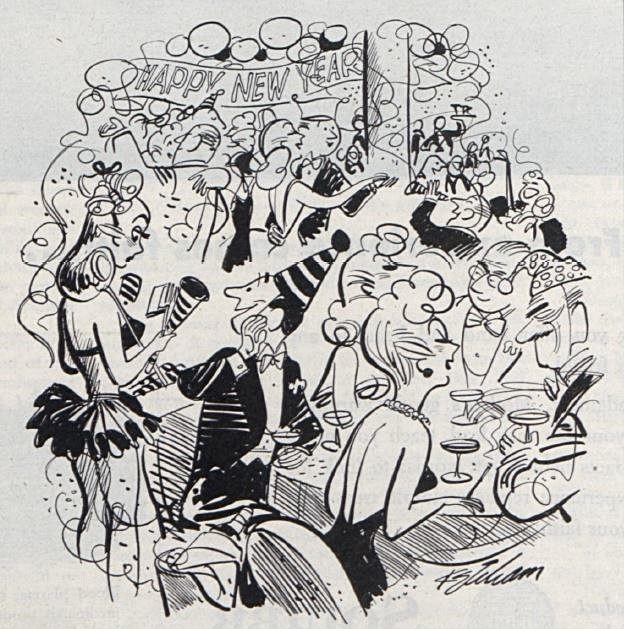
Hank Ketcham
December 29, 1951
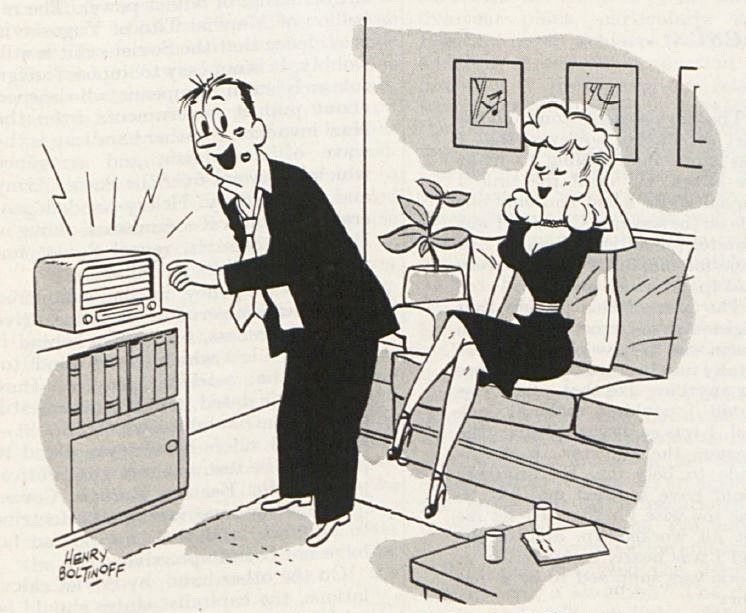
Henry Boltinoff
December 31, 1949
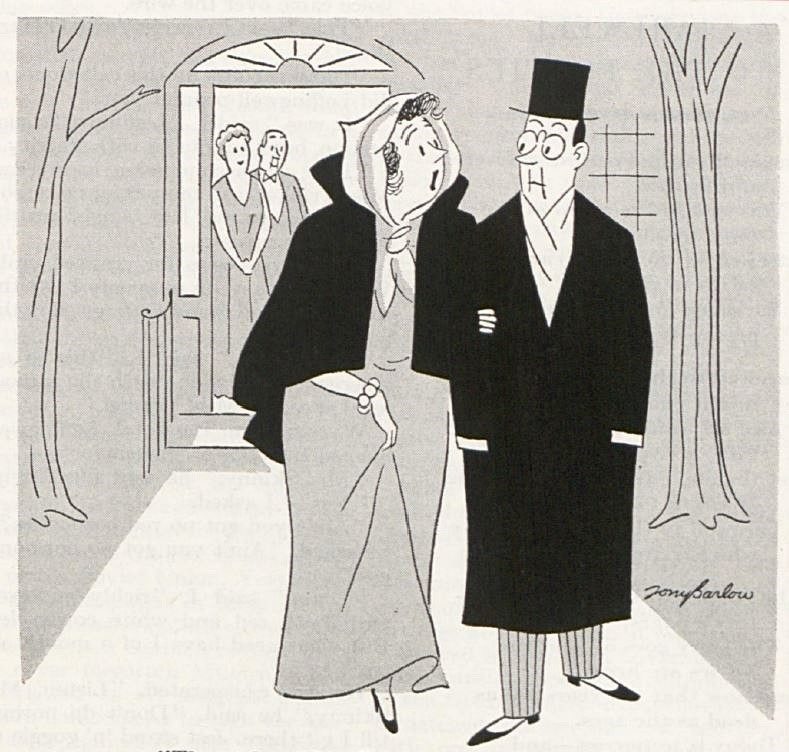
Tony Barlow
December 31, 1949
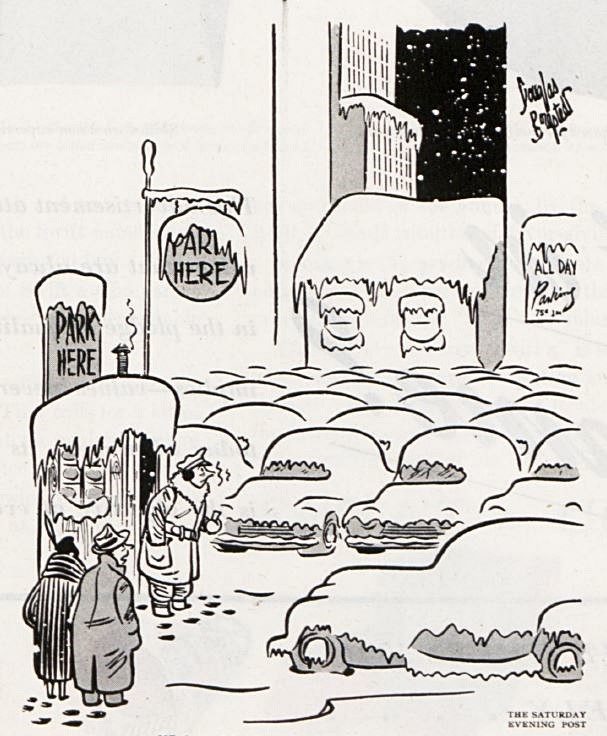
Douglas Borgstedt
December 27, 1947
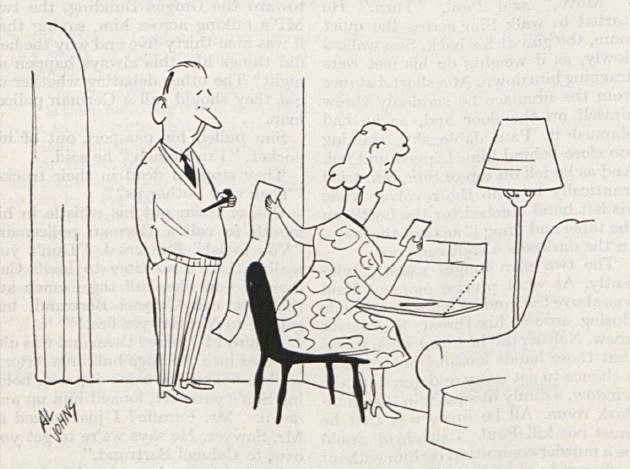
Al Johns
December 30, 1950
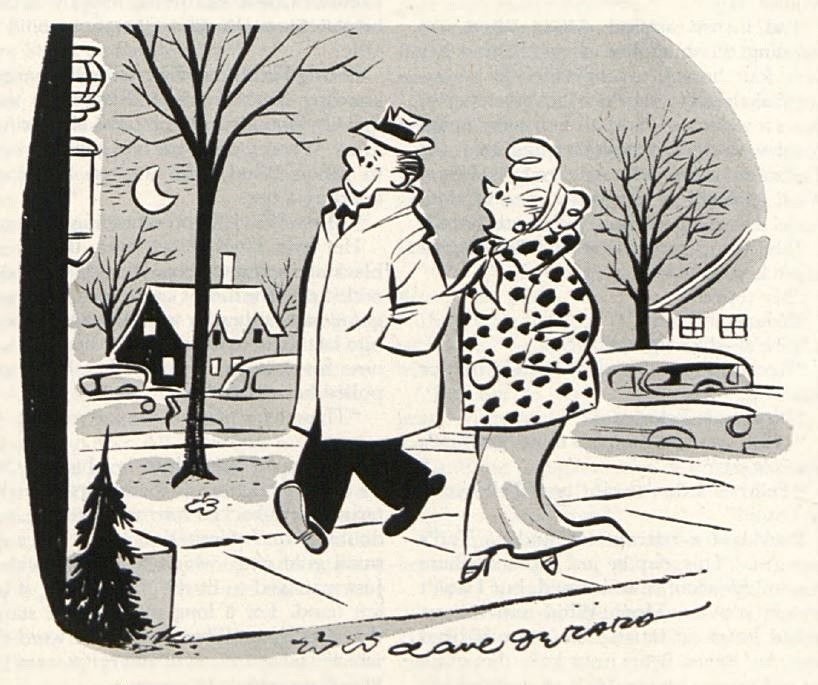
Dave Geraro
December 31, 1955
In a Word: Auld Lang Syne
Managing editor and logophile Andy Hollandbeck reveals the sometimes surprising roots of common English words and phrases. Remember: Etymology tells us where a word comes from, but not what it means today.
We’re less than a week away from New Year’s Eve, when people around the world will gather to count down to the beginning of the new year. As that counter hits zero, the air will be filled with renditions of “Auld Lang Syne,” that classic New Year’s anthem that millions of people recognize but few actually know the words to, much less what those words mean.
The lyrics to “Auld Lang Syne” are often attributed to a poem by the Scottish poet Robert Burns. But Burns was a great preserver of old Scots songs, and he says he recorded “Auld Lang Syne” in 1788 from an old man’s singing. The truth is likely somewhere in between: Burns didn’t write the original song, but he edited (or “mended”) it to his taste.
The words to “Auld Lang Syne” are written in Scots, which some consider a dialect of English and others consider a separate language. The phrase auld lang syne literally translates to “old long since,” a Scottish idiom meaning “old times’ sake.” In the original Scots, the first verse and the chorus of the song — which, unless you’re Scottish, are probably the only parts you’ll hear at a New Year’s party — go like this (according to Scotland.org):
Should auld acquaintance be forgot,
And never brought to mind?
Should auld acquaintance be forgot,
And auld lang syne.
Chorus:
For auld lang syne, my jo,
For auld lang syne,
We’ll tak a cup o’ kindness yet,
For auld lang syne.
The poem is about reminiscing with an old friend about happy times long past, but none of the verses specifically mentions the start of the new year. So how did the song become a New Year’s staple?
On December 31, 1929, Guy Lombardo and the Royal Canadians (shown in the picture above) were tapped to play a New Year’s Eve radio broadcast from the Roosevelt Hotel in New York City. Just after midnight, they broke into “Auld Lang Syne.” It was a hit, so a year later they did it again. Eventually, it became the group’s signature tune, which they performed every New Year’s Eve — first on radio and then on television — until 1976.
Today, Guy Lombardo — who died in 1977 with three stars on the Hollywood Walk of Fame — isn’t as well known as he once was. But the musical tradition he created nine decades ago lives in on celebrations around the world.